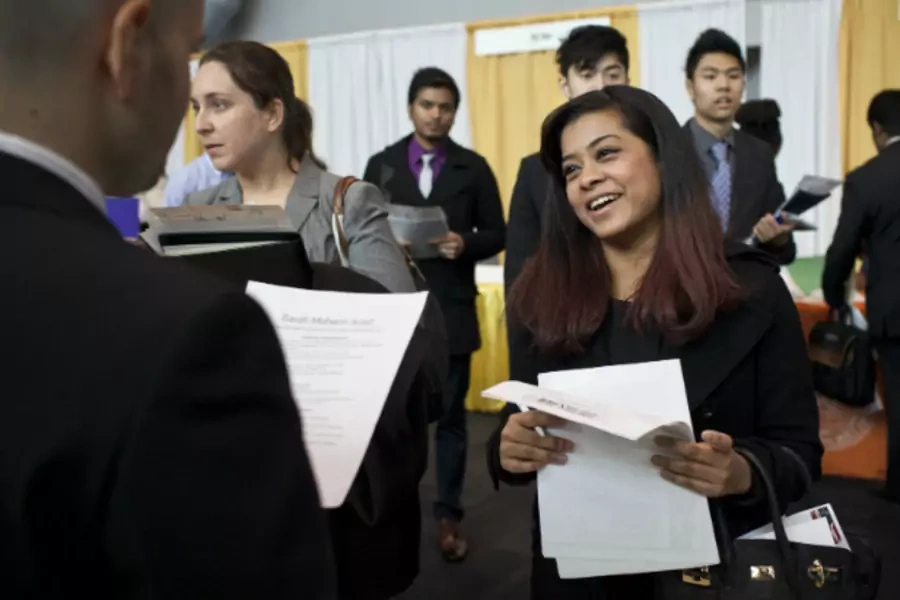Morning Brief: Corporations Helping to Shape University Curricula

More on:
To help fill their pipeline of young engineers and scientists to replace retiring baby boomers, large corporations are helping to shape the curriculum of technical programs at major universities (Bloomberg). Firms are engaging students early in their academic careers, and pushing universities to develop more industry focused curricula. As Boeing’s senior Vice President for Human Resources explained: “[Universities] need to provide our students with hands-on, real-world practical application from day one. So, when they show up at the first job, not only can they find information, not only can they develop it, they can actually do real work.”
CFR Senior Fellow and Renewing America Director Edward Alden discusses the shortage of skilled workers in the U.S. manufacturing pipeline and the need for firms, governments, and unions to work together to encourage young people to pursue manufacturing careers, and schools to increase relevant education.
Vouchers Drive Catholic School Growth
After decades of decline, enrollment in Catholic schools in on the rise, helped by new voucher programs (WSJ). In the nine states with voucher programs, Catholic schools tend to benefit disproportionately because they are usually urban, have openings, are established in their communities, and are usually less expensive than other private schools. Catholic schools generally outperform public ones on test scores and graduation rates, but critics argue that vouchers drain public school resources while tending to go to the brightest students with the most engaged parents.
Choice-based school reforms have attracted considerable debate among experts. The state of Louisiana has become a kind of national laboratory for proponents of choice-based reform. Renewing America contributor Steven J. Markovich discussed recent Louisianan educational reforms in a Policy Initiative Spotlight.
Education and human capital. Read more from experts discussing ways to improve U.S. education and immigration policies.
Debt and Deficits
Economists Debate Further Fed Intervention
Nobel laureate Gary Becker argues against a further round of quantitative easing (QE3). Becker believes QE3 would be ineffective, because interest rates cannot go significantly lower, and bank reserves are already swollen. While acknowledging that past quantitative easing did little to stimulate the economy, former chairwoman of President Obama’s Council of Economic Advisers Christina Romer advocates for QE3 (NYT). She believes the Fed must act because changes in fiscal and housing policy will not occur before the election, and that QE3 can be made more effective by not specifying its size and duration.
Debt and deficits. Read more from experts on the challenges in reducing U.S. debt.
Innovation
Silicon Valley Bank Opens UK Branch
Silicon Valley Bank (SVB)—which helped finance the growth of tech giants such as Cisco and Electronic Arts—opened its first European branch in the UK (FT). SVB’s entry is expected to boost UK startups; SVB has developed the capability to lend to young firms without revenues by a thorough evaluation of their protectable intellectual property. SVB’s contributions to U.S. job growth were highlighted by the Export-Import Bank of the United States, which awarded SVB its small business lender of the year award in 2011.
In the face of persistently high unemployment, policymakers and workers look to innovation and entrepreneurship, the primary engine of U.S. job growth over the past thirty years. This CFR Backgrounder by Steven J. Markovich discusses how entrepreneurs create and finance startups and the ramifications of policies such as the JOBS Act.
Tech Eyes Turn to Apple
This week, Apple will host its annual week-long conference for technology developers, WWDC. Apple is one of the most influential tech firms, and rumored innovations in its operating system (TechCrunch), and hardware (TechCrunch) are likely to shape industry trends. CEO Tim Cook’s keynote address with occur today at 1pm ET, 10 am PT. Websites such as Wired, CNET, and ABC News will live blog the event.
Innovation. Read more on how the U.S. capacity to innovate could play a chief role in economic growth.
The Morning Brief is compiled by Renewing America contributor Steven J. Markovich.
More on:
 Online Store
Online Store